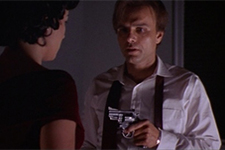Bound (4K UHD)
|  When Bound was released in 1996, I and a number of other critics couldn’t help but note that the searing cinematic debut of the Wachowski Brothers (as they were then known) put them in a rapidly growing league of dynamic brother writer/director teams, joining Joel and Ethan Coen, who made their debut in 1984 the brutal Texas noir Blood Simple and Allen and Albert Hughes, who were only 21 when they made their mark with the urban drama Menace II Society (1993). Andy and Larry Wachowski were Chicago-based college dropouts who, in their directorial debut, displayed the kind of commanding control of film that many 20-year veterans would sell their souls for. As I wrote at the time, “These guys know how to make a movie.” As it turned out, their scorching take on noir tropes through the lens of lesbian sexuality was the opening act to a most fascinating (and sometimes frustrating) cinematic career. The Wachowskis would go on to eternal cinematic infamy with their next film, the genre-defying cyberpunk action thriller The Matrix (1999), which spawned a trilogy of films and became a cornerstone of early 21st-century cultural discourse about everything from fashion to hacking to visual effects. Along the way they wrote and directed a number of increasingly disappointing would-be blockbusters, starting with Speed Racer (2008) and culminating with Jupiter Ascending (2015). During that time they also both transitioned to women, becoming the first major Hollywood trans directors, since rechristened Lilly and Lana Wachowski. At the time of its release, Bound felt like one part Tarantino, one part Coen Brothers, and two parts Hitchcock, with a sprinkling of Scorsese. It is mostly slick surface, but the Wachowskis’ single-minded intensity of purpose bleeds into every frame, giving Bound a relentless, virtuosic energy. It is tough, darkly comical, highly stylized, and dazzling in its ability to draw you into its shady dealings and double-crosses. It is both deathly serious and playfully parodic, often at the same time. In the best tradition of film noir, the first half of the film involves the planning and carrying out of an intricate plan that almost works, and second half follows the characters as they deal with the various messes that ensue. The story concerns Violet (Jennifer Tilly), the longtime girlfriend of Caesar (Joe Pantoliano, doing his best Joe Pesci schtick), a mid-level member of the Chicago Mafia (or “The Business,” as he refers to it). Violet falls in lust with an ex-convict just out of jail named Corky (Gina Gershon), who has been hired to renovate the apartment next door. In what can only be assumed to be a purposeful play on eye-rolling porn cliches, Violet calls Corky over to her apartment to retrieve a lost earring from the pipe under her kitchen sink (the Coens themselves parodied this very trope two years later in The Big Lebowski). With her tough mouth, baggy pants, combat boots and cropped hair, Corky is all hardened butch, while Violet is all slinky feminine charm, with her tight skirts, black stockings, and heavy lipstick. Physically they are complete opposites, but as the film progress, both Corky and Violet, as well as the viewer, begin to realize how much they have in common. And the main thing they have in common is ambition. Violet is sick of Mafia life—sick of sitting in the living room while Caesar and his cronies beat a man in the bathroom and cut off his fingers because he stole money from them. She is sick of being Caesar’s arm candy, absorbing his condescension, playing the sex kitten role he needs to prop up his tough-guy persona. So, she comes up with a plan. She and Corky devise a complicated scheme to snatch $2 million right out from under Caesar’s nose when he is supposed to be delivering it to the boss, Gino Marzzone (Richard C. Sarafian), and then blame it on the boss’s obnoxious son, Johnnie (Christopher Meloni), with whom Caesar has a long-running beef. It is a slick plan, to be sure, but it also relies a bit too much on predicting Caesar’s behavior once he realizes the suitcase is filled with newspapers instead of hundred-dollar bills. Unfortunately for Violet and Corky, he doesn’t act exactly as they predicted, and the next thing you know, the bathtub is stacked with dead bodies, cops are snooping around, other Mafia members are getting suspicious, and Violet and Corky are tied up and about to have their own fingers cut off. The Wachowskis navigate their way through these dark proceedings with delicious intensity; at every moment of the film you can sense their verve, their absolute commitment to not making a single frame anything less than exhilarating. This sometimes leads to stylistic overkill, but when it is this entertaining, who cares? The first part of the film deals graphically with the affair between Violet and Corky, marking Bound as a rare Hollywood foray into a same-sex relationship that isn’t either campy, psychotic, or ridiculous. The Wachowskis have spent much of their careers challenging boundaries and categories, and it is hard not to read Bound back through a trans lens given that, at the time, they were Andy and Larry, rather than Lana and Lilly. More than a few straight male critics (including myself) mused at the time that the explicit lesbian sex scenes were filtered through a hetero-masculine lens, although many queer critics have since defended their authenticity (it helped that sex-positive feminist activist Susie Bright acted as technical advisor). Not surprisingly, the MPAA originally rated Bound NC-17, which fit in with the system’s notorious tendency at them time to treat straight and gay sex scenes differently (a point that Kirby Dick demonstrated quite forcefully in his 2006 documentary This Film Is Not Yet Rated). Once the plan to steal the $2 million gets rolling, though, most of the overt sexuality is sidelined in favor of classic Hitchcockian suspense, tension, and plot complications. There are numerous standout sequences, one of the best being the one in which two policemen are investigating gunshots reported coming from Caesar and Violet’s apartment. Caesar has pulled a rug over a large pool of blood in the middle of the living room, and the Wachowskis gives us an extreme close-up of one of the policemen unknowingly stepping on it, forcing blood to squish up through the fabric. The film is at its best when the Wachowskis are focused on creating mood and tension, and they were aided greatly by Bill Pope’s fine cinematography and a pounding blues-rhythm score by Don Davis (both of whom would go on to work on The Matrix films). They pull out every cinematic trick in the book—slow motion, high camera angels, extreme close-ups, zooms, extensive use of shadows, flashbacks, overlapping action, and sweeping camera movements—and it all works marvelously, drawing us into a vice-like grip that holds firm for nearly two hours. Granted, Bound is ultimately a superficial film—all surface and style with very little human feeling outside of florid emotions like fear and anger and lust and vengeance. Violet and Corky have intense sexual chemistry, but you never get the sense that there is anything passing between them beyond physical and monetary desire (they are truly in lust, not in love). We are on their side, but only because the men against which they are positioned are so much worse. From a moral perspective, Bound fits right in with noir’s worst nihilistic impulses. The fact that Violet and Corky get away in the final reel upends the genre’s typical reliance on punishing female sexuality and aggression (although, to be fair, the men are punished, as well). Like Lawrence Kasdan’s Body Heat (1981) a decade and a half earlier, those impulses are instead rewarded, which gives the film an air of absolution.
Copyright © 2024 James Kendrick Thoughts? E-mail James Kendrick All images copyright © The Criterion Collection | |||||||||||||||||||||||||||||
Overall Rating: 


 (3.5)
(3.5)


